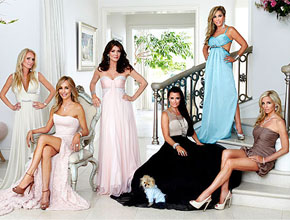Reality TV Fever Pitch
In the wake of “The Real Housewives of Beverly Hills” cast member Taylor Armstrong’s estranged husband Russell’s suicide last month, I’ve been thinking a lot about reality TV. In particular, the Bravo network’s programming schedule and not just the season premiere of the series that aired on Monday night that included a thrown together opening segment semi-addressing the elephant in the room.
Reality TV had me back when I was a sophomore in high school with “The Real World” as a sociology experiment about what would happen when Julie from Alabama mixed with openly gay housemate Norman and insanely hot (but not so bright) Eric. I’ve always been fascinated with questions in life like this. Who people actually become in situations outside their comfort level in their everyday world. But, we are now at a point where what we watch on television in 2011 seems beyond a voyeuristic notion of watching what people generally do behind closed doors playing out in front of a camera.
What we’re all watching now is just gross. It feels like that cycle in tabloid journalism right after a celebrity couple dates, marries, and speculation about pregnancies are written about ad nauseam to when the tide abruptly turns to the doom and gloom storyline of when it’s ending and shady details of who’s cheating. Not to belittle the scope of what has happened, but yes, reality TV has reached that shift, where it’s all fun and games until someone winds up dead.
In The New York Times a couple of weeks ago, there was an excellent piece you can read here about Reality TV having its Jenny Jones moment. You might remember that reference when, during the height of talk shows overrunning American television sets, Jenny Jones had a guest on her show that confessed his love to an unsuspecting male friend. Three days after the taping, the recipient of cupid’s unrequited arrow shot and killed his suitor.
What is Bravo executive, Andy Cohen’s role in all this? As someone who knows more about the ins and outs of the television industry than my mother in Kansas, but less than say, my friend who was Bill Maher’s assistant for a spell in Los Angeles, I’m not being cynical to think producers prod and formulate and structure things to happen on any and all of these shows. If not, we’d all end up flipping channels the second one watches someone like me brushing my teeth and walking my dog everyday. It’s boring and no one would tune in, although a couple of weeks ago you might’ve witnessed my dog getting his arse kicked by an off leash pit bull in my neighborhood, but that’s about as scandalous a scenario as I would potentially give a viewer. The truth—I’d never get picked up for a second season.
But boy, the “Housewives,” they bring it seemingly without remorse that these are people’s lives. These now recognizable stars are the same people that likely assume that a stint on reality TV will pull them out of whatever suburban oblivion they are wandering around in to being financially set and it will lead to bigger and better. But, ultimately, it’s costing cast members’ marriages, money, and perhaps even a life. Does the onus rest solely on the show?
At this point, the viewer now has been clued in that your marriage isn’t perfect, you’re about to lose your home to foreclosure, you filed Chapter 11, your husband might be going to prison for fraud, and your son has been arrested for shoplifting a $14 razor from Wal-Mart (sorry, I just lumped a bunch of different people from different “Housewives” franchises, but hopefully you get the gist). We know this reality, yet we still watch the façade of a happy marriage, a picture perfect home, a thriving career, and obedient children that are well-adjusted functioning members of society.
Last week I was at an event with several of the Atlanta housewives cast members. I watched NeNe Leakes’ handler cut in front of me in the bar line because he deemed NeNe’s wine more important than mine. I then watched her gab to her entourage through the entire fashion show while fanning herself in the front row. Someone gave her that sense of entitlement. Who? Was it the viewer? The producers in order to coerce good television out of them?
Either way, it’s reached a fever pitch. And while I love Andy Cohen, I think he’s fun and his aftershow hilarious, he needs to address the reality of what we’re watching on his network versus what is actually reality outside the confines of the show that every viewer is well aware of. Until then, I’m over it.









